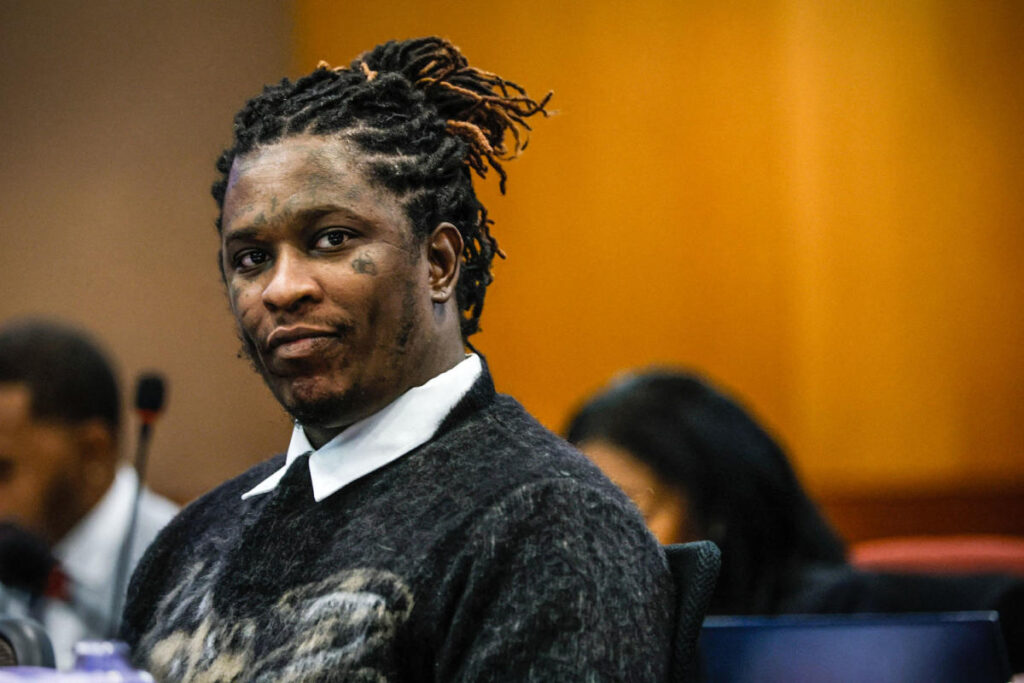Atlanta rap star Young Thug, born Jeffery Lamar Williams, made headlines on Thursday by changing his plea to guilty in a lengthy criminal trial that has captured the attention of court observers for nearly two years. This development represents a significant conclusion in a case steeped in complexity, as Young Thug managed to avoid prison time despite initially facing serious charges. After being asked by Superior Court Judge Paige Whitaker to confirm whether he agreed to a nonnegotiated plea, which meant there was no plea deal between the defense and prosecution regarding sentencing, Young Thug accepted guilt on multiple charges, including drug and gun-related offenses as well as conspiracy and gang participation. Ultimately, Judge Whitaker sentenced him to a total of 40 years, but with his time served, he will be on probation for 15 years, during which he must adhere to strict conditions, such as refraining from travel within the metro Atlanta area and avoiding contact with gang affiliates.
Addressing the court before his sentencing, Young Thug expressed his accountability for the charges against him and acknowledged the weight of his influence in the Atlanta community. He remarked, “I know what I bring to the table and I know what I am,” emphasizing his desire to serve as a positive role model for others. His admission of responsibility and recognition of his potential impact suggest a moment of personal growth for an artist who has faced profound legal challenges in recent years. Young Thug has remained in custody since his arrest in May 2022, when he was charged with allegedly leading a street gang called Young Slime Life (YSL). The group’s members have been associated with various criminal activities, prompting Fulton County District Attorney Fani Willis to utilize Georgia’s Racketeer Influenced and Corrupt Organizations (RICO) statute to draw connections between Young Thug and his alleged gang.
During the proceedings on Thursday, Assistant District Attorney Adriane Love portrayed Young Thug as a pivotal figure in the gang’s alleged violent activities, even referencing lyrics from his songs that promote violence. Love urged the court to impose a harsher sentence of 45 years, divided between prison and probation. However, Judge Whitaker took into account previous discussions regarding Young Thug’s potential release on probation if he provided testimony against his co-defendants, leading her to exercise leniency when determining his sentence. Young Thug’s lawyer, Brian Steel, argued for house arrest instead, pleading that the prosecution had misinterpreted the context of the rapper’s lyrics — insisting they did not promote gang-related behavior.
The resolution of Young Thug’s case comes after a series of plea deals were made by three of his co-defendants, which may have helped expedite his agreement. Initially, 27 co-defendants were named in the case, but as trial proceedings began in January 2023 and continued through to November, the number dwindled as several defendants opted to accept plea deals. Those who took deals were granted reduced sentences in exchange for guilty pleas to various racketeering and gang-related charges. Among these co-defendants were Quamarvious Nichols, Marquavius Huey, and Rodalius Ryan, who similarly faced serious consequences yet managed to secure more favorable outcomes with their agreed pleas. Notably, Ryan will still serve a life sentence for a separate murder charge but has had his prison time in the RICO case reduced to time served.
Throughout the lengthy trial, which has been marked by numerous interruptions and a fluctuating cast of legal representatives, the jury’s formation was disrupted by an array of significant incidents, including a deputy accused of smuggling contraband to a defendant and an unexpected Zoom intrusion during the livestreamed proceedings. Judge Whitaker’s careful navigation through these occurrences highlighted the complexity of the case, which at one point threatened to extend well into the following year. As the trial has unfolded, it has revealed deep-rooted issues concerning crime and gang culture in the Atlanta area, drawing widespread attention to both the judicial system and the circumstances faced by those involved.
The plea change was influenced by a prosecutorial misstep during the last week of testimony, leading to discussions of a possible mistrial. When a state witness was given access to sensitive material inadvertently, it cast doubt on the integrity of the ongoing trial process. This review by the jury created a context where the defense could argue for leniency and highlighted the challenges the prosecution faced in maintaining clarity and focus on the case. Ultimately, Young Thug’s plea closes a tumultuous chapter marked by celebrity, crime, and the intersection of art and real-life violence. His career has encompassed breakthrough hits since 2014 and collaborations with notable artists, culminating in a Grammy Award for co-writing Childish Gambino’s “This Is America.” With this new beginning, Young Thug is now presented with a critical choice: to leverage his influence in the community towards healing and positive change.

